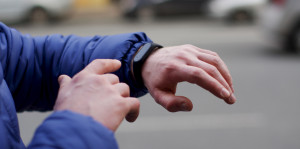While video games, smart phones and other digital devices are often seen as preventing children from having a healthy lifestyle, technology can be used to encourage youngsters to be active.
Childhood obesity has been a problem in many countries around the world for some time and the situation is getting worse.
In 1975 there were five million obese girls, by 2016 there were 50 million. The number of obese boys has risen from six million to 74 million in the same period.
Along with a poor diet, a lack of exercise is a primary cause of obesity. It is estimated the average American child spends more than seven hours a day watching television, browsing the internet and playing computer games.
But the technology that dominates our leisure time could make keeping fit as fun as any video game.
Boosting healthy lifestyles with tech
Through its sponsorship of marathons and other long-distance running events worldwide, Tata Consultancy Services is attempting to help youngsters adopt healthier life choices.
It is showing them how technology, such as wearables and apps, can monitor their progress, help improve performance, and enable them to engage with other budding runners.
As part of its sponsorship activities around the 2017 TCS New York City Marathon, TCS teamed with non-profit organization New York Road Runners (NYRR) to promote the TCS ‘goIT’ initiative.
The purpose of goIT is to demystify computer science and help students gain the skills and confidence to pursue careers in science, technology, engineering and mathematics – otherwise known as STEM.
In the build up to last year’s marathon, children from 12 schools across New York participated in goIT and were challenged to create an app concept that would encourage people to lead more active and healthier lifestyles.
The competition finalists presented their app concepts to an audience of hundreds, with an overview of how their product would be different from similar apps and how they would bring their app to market. And the winning team got to hold the finishing-line tape for the elite wheelchair event on race day.
The 2017 #TCSNYCMarathon was the most memorable yet. As title sponsor and technology partner, we work with @nyrr to make the race experience for runners and fans second to none! pic.twitter.com/F3KhKrIN85
— TCS North America (@tcs_na) December 20, 2022
It’s a marathon, not a sprint
The TCS NYC Marathon is just one of the many global running events the IT and consulting firm sponsors. TCS also supports the Mumbai Marathon, the Amsterdam Marathon, and the Swedish cross-country race Lidingöloppet, among others.
In New York, its financial support of NYRR has enabled the group to provide year-round youth running programs and community races free of charge. This has helped families from underserved or poorer communities to take up the sport.
TCS sponsored 53 youth running events last year in New York alone, with more than 15,500 participants benefitting. The company also sponsors a year-round program designed to improve the NYRR’s IT infrastructure and make it easier for teachers to use.
Since TCS began its partnership with NYRR in 2014, children involved in the sponsored community programs have run more than 5.8 million combined miles.
Reaching a new generation of runners
Wearables such as Fitbits, Garmins and Bluetooth heart rate monitors are used by professional and amateur runners alike to monitor and improve performance.
In the UK, more than a third of people use fitness or health and wellness technology. According to a TCS survey ahead of last year’s London Marathon, one in 10 Brits said the use of fitness tech had the single most positive impact on their health over the past 12 months.
In the future, wearable fitness technology is expected to be refined to the point where it can be incorporated into clothing, such as running shoes and sports bras, which can monitor vital metrics. The amount and variation of data recorded by these wearables is also expected to increase significantly over time.
Such developments will undoubtedly prove a hit with those who are already active, but what about those who are less inclined to stay fit and healthy?
The answer could come in the gamification of fitness.
The potential for gaming to encourage people to be more physically active was demonstrated by the Pokémon Go phenomenon. The smartphone game is based on an augmented reality experience, requiring gamers to go outside and catch Pokémon’s in real locations. The game was credited with increasing users’ fitness.
Over a fifth of people aged 25 to 34 surveyed by TCS said they would use a virtual reality headset to simulate different locations if they could.
The next step could be for these experiences to become augmented into wearables such as glasses which could, for example, allow runners to see their virtual pacemaker without having to take their eyes off the route ahead of them.
Video games have been an important part of youth culture for many years, and that is not going to change any time soon. But, by plugging into this passion, it is possible to encourage a new generation to embrace a healthier lifestyle.
